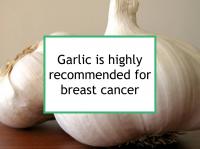Like onions, leeks, chives, shallots, and other members of the allium genus, garlic (Allium sativum) has been shown to have anticancer, antimicrobial, radioprotective, antithrombotic, hypolipidemic, anti-inflammatory, antiarthritic and hypoglycemic effects, as well as improving immune function.
Breast cancer-related effects of eating garlic
Epidemiological studies have reported an association between increased consumption of onions and garlic and a reduction in many different types of cancer, including breast cancer. Garlic contains various substances reported to have anti-breast cancer effects, including organosulfur compounds such as ajoene, allicin and the related diallyl disulfide and diallyl trisulfide, as well as apigenin and enterolactone.
Epidemiological studies
One large European study found that eating onions and garlic was associated with lower breast cancer risk. Another large Italian population study found a relationship between increasing intake of flavones and flavonols found in allium vegetables and a reduction in the risk of breast cancer. A Korean study found an association between onion and garlic consumption and lower incidence of breast cancer.
Garlic cell studies
Numerous studies have shown that garlic and its components inhibit proliferation, reduce migration and invasiveness, and induce apoptosis of cultured human breast cancer cells. Garlic has been shown to decrease DNA strand breaks induced by carcinogens, inhibit DNA and RNA synthesis and protein folding in breast cancer cells, retard the growth of breast cancer cells by causing cell cycle arrest and apoptosis, and suppress angiogenesis. Garlic has also been demonstrated to have protective effects against doxorubicin-induced heart damage.
Organosulfur compounds
The anti-carcinogenic effects of allium vegetables such as garlic are attributed in part to organosulfur compounds (ajoene, allicin, diallyl sulfide, diallyl disulfide, diallyl trisulfide, diallyltetrasulfide, and dipropyltetrasulfide, among others). Ajoene has been demonstrated to interfere with protein folding in triple negative (ER-/PR-/HER2-) breast cancer cells, which in turn causes their death. Allicin and diallyl trisulfide both have been reported to enhance the efficacy of doxorubicin chemotherapy.
Diallyl disulfide has been shown to decrease carcinogen-induced cancers in experimental animals. Diallyl disulfide has also been demonstrated to induce apoptosis (programmed cell death) in both hormone receptor positive (ER+/PR+) and triple negative breast cancer cells. Diallyl trisulfide has been found to induce programmed cell death of ductal carcinoma in situ (DCIS) with areas of micro-invasion. In addition, diallyl trisulfide has also been shown to suppress malignant breast cancer cell invasion and metastasis, thereby delaying the onset or progression of breast cancer. In particular, diallyl trisulfide has been found to inhibit triple negative breast cancer cell proliferation and metastasis.
Apigenin
Garlic is a good source of the flavone apigenin, which has been found to induce apoptosis across a variety of breast cancer cell lines. For example, apigenin has been shown to exhibit potent growth-inhibitory effects in HER2+ breast cancer cells. Apigenin has also been shown to inhibit the growth of patient-derived triple negative organoids and sensitize triple negative cells to doxorubicin chemotherapy. In addition, apigenin has been shown to lessen doxorubicin-induced kidney damage without reducing its cytotoxic effects against tumor cells in a mouse model of breast cancer.
Enterolactone
Postmenopausal women with breast cancer and a high intake of the lignan enterolactone have been found to be less likely to die from their breast cancer than those with a low intake. Enterolactone has also been found to increase the sensitivity of breast cancer cells to radiation, thereby potentially enhancing the treatment effects of radiotherapy.
Garlic supplements can affect some chemotherapy
While, as noted above, garlic can sensitize triple negative cells to doxorubicin, as well as having protective effects against doxorubicin-induced heart damage, garlic supplements have been reported to interfere with the activities of platinum-based chemotherapy drugs such as cisplatin. Garlic supplements have also been shown to reduce the clearance of the chemotherapy drug docetaxel in some women, a result that is likely also to hold for paclitaxel.
Additional comments
Organosulfur compounds are generated upon cutting or chewing garlic. Although some of the anticancer benefits of garlic are retained after cooking or processing it, raw garlic appears to have the most benefits. Raw and processed garlic should both be purchased organically grown.
Sources of information provided in this webpage
The information above, which is updated continually as new research becomes available, has been developed based solely on the results of academic studies. Clicking on any of the underlined terms will take you to its tag or webpage, which contain more extensive information.
Below are links to 20 recent studies concerning garlic. For a more complete list, please click on garlic.
